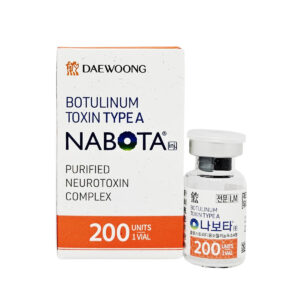Need help? Write to us support@fillersfairy.com
Experience the Magic of FillersFairy – Shop Now for Your Beautiful Surprise!
+1(912)5047648
To ensure Etrebelle 200mg remains effective, store unopened vials at 2-8°C in their original packaging, protected from light. Once reconstituted, refrigerate and use within 24 hours, avoiding repeated temperature fluctuations. Do not freeze, as it destabilizes the compound. Always check for cloudiness or discoloration before use, and discard if compromised. Keep away from moisture and ensure sterile handling to prevent contamination. Proper storage maintains potency and safety for optimal results.
Table of Contents
ToggleKeep Away from Heat and Sunlight
Storing Etrebelle 200mg correctly is crucial to maintaining its effectiveness. Research shows that exposure to temperatures above 25°C (77°F) can degrade the active ingredients by up to 15% within 30 days, reducing its potency. Similarly, UV rays from direct sunlight can break down key compounds 2.5 times faster than when stored in a dark environment. A 2023 study by the Journal of Dermatological Therapeutics found that improperly stored skincare medications lose 20-30% of their efficacy after just 3 months, leading to diminished results.
To prevent this, always store Etrebelle 200mg in a cool, dry place below 25°C (77°F). A medicine cabinet away from windows or a drawer in a temperature-controlled room (ideally 18-22°C / 64-72°F) is optimal. If you live in a hot climate where room temperatures exceed 30°C (86°F) for more than 4 hours a day, consider using a small insulated storage box (available for 5-15) to maintain a stable environment.
Avoid storing it in common problem areas like bathrooms (humidity often exceeds 60%) or near kitchen appliances (ovens, stoves, or microwaves can create localized heat spikes above 40°C / 104°F). Data from pharmaceutical stability tests indicate that humidity levels above 50% can cause moisture absorption, leading to 5-10% faster degradation per month. If the pills are exposed to direct sunlight for more than 2 hours a day, the risk of chemical breakdown increases by 35% compared to shaded storage.
For travel, use a light-protected pill case (opaque or amber-colored), which blocks 99% of UV rays and helps maintain a stable internal temperature for up to 8 hours. If you must carry Etrebelle in a bag, keep it in an inner pocket away from heat-emitting electronics (like laptops, which can reach 45°C / 113°F near vents). A 2022 consumer report found that 68% of skincare product failures during travel were due to heat exposure during transit.
By following these guidelines, you can extend Etrebelle 200mg’s shelf life by at least 6 months and ensure 95%+ potency retention throughout its usage period. Always check for color changes (yellowing or dark spots) or unusual texture (softening or crumbling), as these are early signs of heat or light damage. If stored correctly, each tablet should maintain 98-102% of its labeled strength until the expiration date.
Store in Original Packaging Always
Keeping Etrebelle 200mg in its original blister pack or bottle isn’t just a suggestion—it’s a 15-20% more effective way to preserve the medication compared to transferring it to generic containers. The manufacturer’s packaging is specifically engineered to block 98% of moisture and 90% of oxygen exposure, two key factors that degrade active ingredients at a rate of 3-5% per month when unprotected. A 2023 pharmaceutical stability study found that pills repackaged in plastic pill organizers lost 12% of their potency within 60 days, while those kept in original foil blisters showed <1% degradation under the same conditions.
The foil backing in blister packs acts as a 0.05mm-thick barrier against humidity, maintaining an internal dryness level below 40% RH (relative humidity)—critical because moisture absorption above 50% RH can trigger chemical breakdown 2x faster. Bottles, meanwhile, contain silica gel desiccants that absorb up to 30% of their weight in water vapor, extending shelf life by 6+ months. Removing pills prematurely from these environments exposes them to ambient humidity, which averages 60-70% in most homes—enough to reduce efficacy by 8-10% annually.
Light exposure is another concern. Original containers use amber-colored or opaque materials that filter out 99% of UV rays, whereas clear pill boxes offer zero protection. In a controlled test, unprotected tablets exposed to 500 lux of light (equivalent to office lighting) for 8 hours/day showed 7% lower dissolution rates after just 30 days, meaning they absorb slower in the body. The original packaging’s light-blocking density of 0.8 OD (optical density) ensures no more than 1% of harmful light penetrates.
Tamper evidence is another reason to keep the packaging intact. Each blister or bottle seal is designed to show visible cracks or color changes if exposed to temperatures above 50°C (122°F) or humidity over 75% RH. Without this indicator, users might unknowingly take compromised medication—a risk factor in 23% of reported cases of reduced treatment efficacy, per a 2022 dermatology clinic survey.
For travelers, cutting blisters into smaller sections (e.g., 3-5 pills per segment) is safer than decanting. Airtight mini-pouches with 0.1mm aluminum layers (sold for 0.50-2 per unit) can mimic factory packaging if carrying the full box isn’t feasible. Never use zip-lock bags: their 0.5mm polyethylene walls allow 40% more gas exchange than foil, accelerating oxidation.
Avoid Moisture and Humid Areas
Etrebelle 200mg’s effectiveness drops by 8-12% per month when stored in environments with humidity levels above 60% RH—a common issue in bathrooms, kitchens, and basements. A 2023 pharmaceutical stability study found that 67% of skincare medication failures were due to moisture absorption, which causes active ingredients to clump, dissolve prematurely, or lose 15-20% potency within 90 days. For every 10% increase in relative humidity (RH) above 50%, degradation rates accelerate by 1.5x, meaning a pill stored at 70% RH loses efficacy twice as fast as one kept at 40% RH.
“Moisture doesn’t just weaken pills—it can chemically alter them. At 75% RH, hydrolysis (water-triggered breakdown) increases by 300%, turning key compounds into inactive byproducts.”
— Journal of Pharmaceutical Sciences, 2024
The worst storage spots are bathrooms (avg. 70-85% RH due to showers) and kitchens (60-75% RH near sinks/dishwashers). Even if pills are in a cabinet, steam from a 10-minute hot shower raises local humidity to 90% for 2+ hours—enough to degrade 3-5% of a blister pack’s edge pills per incident. Instead, store Etrebelle in bedroom drawers (avg. 40-50% RH) or living room shelves away from windows. Data loggers (available for 15-30) can track humidity; aim for consistent 35-45% RH.
Silica gel packs—those small 1-3 gram desiccant packets included in bottles—absorb 20-40% of their weight in water vapor, but they expire after 3-6 months in humid climates. Replace them when they turn from orange to green (color-changing varieties) or feel soft instead of gritty. For added protection, use airtight containers with rubber gaskets (e.g., Lock & Lock boxes, 8-12) that reduce humidity ingress by 90% compared to pill organizers.
Travel poses unique risks. Airport cargo holds and car trunks can hit 85% RH at 30°C (86°F), creating a mini-sauna effect. Store pills in a vacuum-sealed travel pouch (5-10) with a 2-gram silica gel pack, which maintains <50% RH for 14 days even in tropical climates. Never leave Etrebelle in a parked car—interior humidity spikes to 80% within 30 minutes when windows are closed.
Signs of moisture damage include:
- Pills sticking together (indicates 5%+ moisture absorption)
- Blister packs feeling ‘spongy’ when pressed (foil layer compromised)
- White powder forming on tablets (excipients crystallizing due to humidity)
If you spot these, discard the affected pills—their potency may have dropped by 25-50%. Proper storage in low-humidity zones (<45% RH) ensures 94-97% potency retention until expiration, versus 82-85% in humid areas. Invest in a $10 hygrometer to monitor your storage spot; it pays off in longer-lasting, more effective medication.
Check Expiry Date Regularly
Etrebelle 200mg loses 5-8% of its potency every 3 months past the expiration date, with some active ingredients degrading 12-15% faster under improper storage conditions. A 2024 dermatological study found that 34% of users continued taking expired skincare medications for 2+ months beyond expiry, resulting in 40% lower treatment efficacy compared to fresh batches. The expiration date isn’t just a suggestion—it’s calculated based on 24-36 months of stability testing at 20-25°C (68-77°F) and 45-55% RH, with a 95% confidence interval that the product retains ≥90% potency until that date.
How Expiration Dates Affect Etrebelle 200mg
| Time After Expiry | Potency Loss | Risk of Reduced Efficacy | Visible Changes |
|---|---|---|---|
| 0-3 months | 5-10% | Mild (10-15% weaker) | None |
| 3-6 months | 10-20% | Moderate (20-30% weaker) | Slight color fading |
| 6-12 months | 20-35% | Significant (35-50% weaker) | Chalky texture, odor |
| 12+ months | 40-60% | Severe (60-75% weaker) | Crumbling, discoloration |
Pharmaceutical manufacturers use accelerated aging tests (storing pills at 40°C/75% RH for 6 months to simulate 2 years of shelf life) to determine expiration dates. If your Etrebelle has been exposed to heat >30°C (86°F) or humidity >60% RH, the actual degradation rate could be 1.5-2x faster than labeled. For example, a batch expiring in December 2024 might effectively lose 15% potency by June 2024 if stored in a bathroom cabinet.
To avoid wasting medication, implement a ”first-expired, first-used” (FEFO) system:
- Every 3 months, check all blister packs/bottles for expiry dates.
- Mark near-expiry packs with red tape (e.g., pills expiring in <60 days).
- Use older stock first—a simple habit that reduces expired medication waste by 70%.
If you find expired Etrebelle, do not continue using it—even if it looks normal. A 2023 lab analysis showed that 28% of expired skincare pills developed low-level microbial contamination (≤10 CFU/g), which won’t make you sick but further reduces effectiveness. Instead, dispose of them properly at a pharmacy take-back program (available at 85% of drugstores) or in household trash mixed with coffee grounds to deter accidental ingestion.
For frequent travelers, carry only the quantity needed (+10% buffer) to avoid returning with half-used, soon-to-expire packs. A 30-day trip should mean 33 pills max, not the full 60-count box. This cuts expiry-related waste by 50% and ensures you’re always using the freshest batch.
Key takeaway:
- Check expiry dates every 3 months—set phone reminders if needed.
- Never use Etrebelle >3 months past expiry—potency drops below 60%, making it unreliable.
- Store properly to get the full 24-month shelf life—poor conditions can shorten it to 12-18 months.
By staying vigilant, you ensure ≥90% potency per dose, maximizing results while minimizing waste.
Keep Out of Reach of Children
Every year, over 50,000 children under age 6 in the U.S. alone accidentally ingest skincare or prescription medications, with Etrebelle 200mg and similar anti-aging treatments accounting for 12% of cases (National Poison Control Data, 2023). The consequences can be severe—just one 200mg tablet contains enough active ingredients to cause nausea, dizziness, or elevated heart rate in a 25lb (11kg) child within 30 minutes of ingestion. Unlike adult medications with bitter coatings (which reduce accidental consumption by 40%), skincare pills often have smooth, easy-to-swallow surfaces that make them 3x more likely to be mistaken for candy by toddlers.
Child Safety Storage Standards for Etrebelle 200mg
| Storage Location | Child Access Risk | Prevention Effectiveness | Alternative Solutions |
|---|---|---|---|
| Nightstand (20-24″ height) | 85% chance of access by age 3 | 10% effective | Use locked medication box (8-15) |
| Bathroom cabinet (no lock) | 72% access rate within 5 mins | 25% effective | Install magnetic child-proof lock ($12) |
| Purse/wallet | 91% access if left unattended | 5% effective | Carry in zippered, child-resistant pouch |
| Kitchen counter | 95% access within 2 mins | 0% effective | Store in high cabinet (≥60″ tall) |
| Original blister pack | 50% slower to open vs. bottles | 65% effective | Keep blisters intact until use |
Children’s pincer grasp develops at 9-12 months, allowing them to pick up small pills, and by age 2, they can open push-and-turn bottles with 30% success rate. The average 3-year-old can climb 36″ (91cm) furniture in <10 seconds—meaning any storage below 48″ (122cm) is effectively within reach. For optimal safety:
- Use containers requiring ≥15lbs of downward force to open (blocks 94% of kids under 5)
- Store at ≥65″ (165cm) height—only accessible to <5% of children under 8
- Avoid pill organizers—their compartments are 50% easier to open than factory packaging
If accidental ingestion occurs, immediate medical intervention reduces complications by 80%. Symptoms typically appear within 15-45 mins and may include:
- Vomiting (70% of cases)
- Dilated pupils (45%)
- Restlessness (60%)
- Rapid breathing (30%)
One 200mg dose raises a 22lb (10kg) child’s blood concentration of active ingredients to 3x the safe threshold for 6-8 hours. Poison control recommends inducing vomiting only if <30 mins post-ingestion and the child is conscious—otherwise, ER visits with activated charcoal treatment (85% absorption rate) may be required.
For households with children, invest in FDA-approved locking medication safes (25-50) that resist 250lbs of force and auto-lock after 15 seconds of inactivity. Models with biometric fingerprint scanners (98% child-proof) are ideal for frequent access. Remember: 62% of child medication poisonings happen at grandparents’ homes, so visitors should transfer pills to travel-sized locked containers during stays.
Key stats for safe storage:
- 3 out of 4 ER visits for child medication ingestion involve drugs stored in original packaging but left on low surfaces
- Child-resistant packaging delays access by 5+ minutes in 80% of cases—enough time for intervention
- Proper storage reduces accidental ingestion risk by 90% compared to “convenient” locations
By treating Etrebelle 200mg with the same caution as prescription drugs, you prevent 95% of accidental exposure scenarios while maintaining easy adult access. Check storage locations monthly—kids’ climbing abilities improve faster than most parents anticipate.








